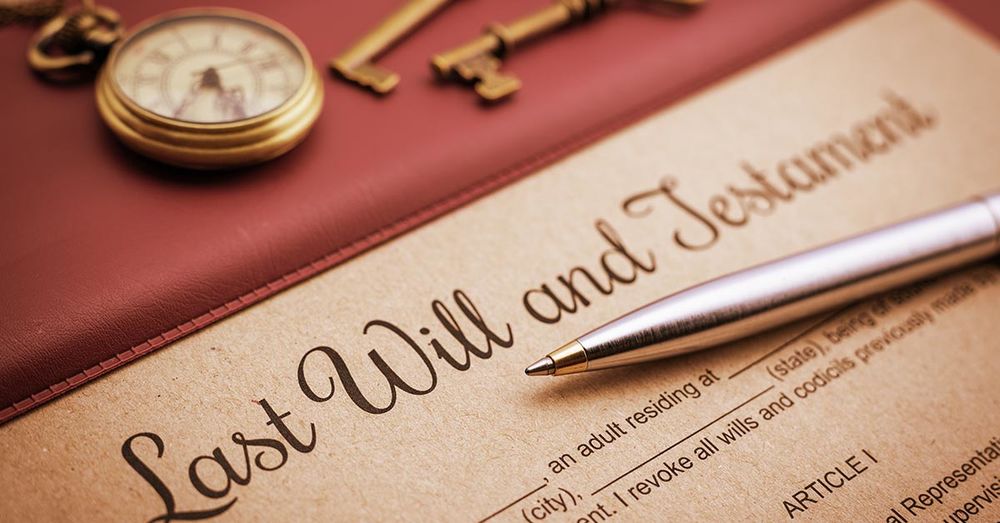When composing your last will and testament in Florida it’s always best to work with an estate planning attorney. Not only can an attorney ensure that everything necessary is included in your official will, but they can also help you to find ways to reduce the amount of estate taxes your heirs will have to pay. Today, Florida attorney Matt Weidner is checking in with a few directions on what you should include in your last will and testament to help you plan before visiting your attorney.
10 Things to Include in Your Last Will and Testament in Florida
1. The Name of Your Executor
The executor of your will is the person whose responsibility it will be to administer your estate. It’s very important that this person be business savvy or have legal expertise OR that they have an attorney who can help them to navigate the process. Most people choose their attorney or a close family member to serve as the executor of their estate.
2. Who Will Be Guardian to Your Minor Children?
If you have minor children at the time of your death, who should care for them? In some cultures, this is a responsibility accepted by godparents, but it’s always best to check with someone whom you intend on naming as legal guardian to your children. When naming this person or persons, consider their experience, their relationship with your children, and any financial considerations.
3. Trusts
Do you have a trust or will you have a trust in place that will need overseeing? If so, who will oversee this trust? Additionally, if you don’t already have the trust in place, what kind of stipulations do you want to put on the trust fund?
4. Beneficiaries
This one seems like a no-brainer, but when writing your last will and testament in Florida, make sure to name any beneficiaries whom you wish to receive specific property and what property you wish for them to receive. Traditionally, this is done only for significant purchases, property, or items with sentimental value.
You should also consider naming alternate beneficiaries.
5. How to Divide Your Assets
Dividing assets can be a difficult process if you aren’t VERY CLEAR on the division process in your last will and testament in Florida. For example, if you want your bank accounts and stock portfolio to be divided equally among your three children, be specific in how this should happen – what should happen to that remaining 1%? How should specific stocks be divided?
6. What Should Happen to Your Business / Business Assets
If you are a business owner, be sure to outline what should happen to your business after you die. Do you have a partner who will inherit it all or perhaps you want your spouse to take over? Maybe you prefer that your partner manage your share of the business until your child comes of age? Should your business laptop be given to whoever inherits the business or should it be destroyed?
7. How Should Taxes, Expenses, and Debts Be Paid?
At the time of your death, you may wind up owing debts, needing to cover funeral expenses and estate expenses, and needing to account for your final taxes. When writing your last will and testament in Florida, it’s important to outline how these things should be paid. For example, fo you have life insurance that will cover your final expenses? Do you want your vehicle to be sold to cover debts?
8. Real Estate Management
If you own real estate it can be helpful to include a clause in your last will and testament in Florida that covers the maintenance and upkeep of that real estate. This is particularly important if your home is left in the care of someone else until your child comes of age or if you own a rental property that you want to continue to be rented so that you might fund your child’s education. Touch on things like HOA dues, garden maintenance, and regular seasonal maintenance.
9. Custody or Visitation of Pets
Under Florida law, your pets are considered property, so it’s important that you provide for them in your last will and testament. Who will care for them? Will you provide financially so that they can maintain the lifestyle you have been providing? What special requirements do you have for your pet’s needs?
As with children, it’s important to discuss guardianship of pets with the person you intend on naming BEFORE you name them. Make sure that they are willing to take on this responsibility and that they are able to do so – for example, your older sister may be more than willing to take your dog after you die, but if she is housebound and unable to afford a dog walker, this may not be the best solution.
10. A Residuary Clause
This is a clause that states what should happen to the rest of your estate after specific items have been left to specific individuals as per your instructions. For example, if you have a set of encyclopedias and leave volumes A and B to your niece, what would happen to the remaining volumes? Should they be divvied up between all of your heirs, should they be donated to charity, or should they too be given to your niece? Of course, this is simplifying things a little bit, but it gives you a picture of how a residuary clause works.
Ready to Make Your Last Will and Testament in Florida?
If you’re ready to complete your last will and testament in Florida, Weidner Law can help! Just give us a call at 727-954-8752 to make an appointment today or submit an online request using our contact form located here.

